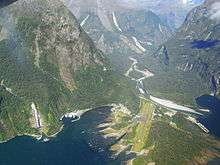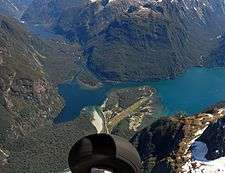Milford Sound Airport
Milford Sound Airport (IATA: MFN, ICAO: NZMF) is a small but very busy (in terms of flight movements) airport in Milford Sound, in New Zealands Fiordland region of the South Island. It is mainly used by tourist / flightseeing operators.
| Milford Sound Airport | |||||||||||
|---|---|---|---|---|---|---|---|---|---|---|---|
 Milford Sound Airport as seen from an aircraft | |||||||||||
| IATA: MFN – ICAO: NZMF | |||||||||||
| Summary | |||||||||||
| Airport type | Public | ||||||||||
| Operator | Ministry of Transport | ||||||||||
| Serves | Milford Sound | ||||||||||
| Location | Milford Sound | ||||||||||
| Elevation AMSL | 3 m / 10 ft | ||||||||||
| Coordinates | 44°40′24″S 167°55′24″E / 44.67333°S 167.92333°E | ||||||||||
| Runways | |||||||||||
| |||||||||||
Location
The Airport is located in Milford Sound, Southland, New Zealand, and serves the Milford Sound Tourism Industry including Boats, Kayaks, Milford Track as well as the fishing boats based at Milford Sound. It stands at the head of the Fiord at the junction of the Cleddau and Arthur rivers.
History
On 17 November 1938, a Southland Airway’s Puss Moth piloted by Arthur Bradshaw made the first landing in at Milford Sound. However, any further development for air operations into the Fiord was delayed by World War II.
Post war pilot Fred ‘Popeye’ Lucas was the next to land an aircraft in Milford. He landed on the sand spit in his Southern Scenic Airtrips Auster on 22 August 1951. This then sparked the addition of an airstrip for use by his company to expand tourism into Milford Sound. An airstrip was constructed, initially 550 yards (503 metres) in length with the first official landing achieved in May, 1952.
Over the years the airstrip has been upgraded and lengthened till today’s sealed strip of 792 metres. In order for Southern Scenic Airtrips and National Airways Corporation (NAC) to be able to fly the larger twin-engine aircraft into the area the airstrip became officially licensed in 1956.
Prior to the ability of air operations, Milford Sound had no access in the winter months as the roads became impassable. With the addition of the airstrip, it was recorded that by 1964 more than 400 tourists were taking the ‘Gateway to Magnificence Experience’ flight to Milford Sound each month at peak holiday time.[1]
Activity

Weather permitting, there is substantial daily charter traffic of light aircraft (mostly Britten-Norman Islander, Cessna 172, 206, 207, Cessna Caravan. GA8 Airvan) to and from Queenstown, Wanaka and Te Anau and on sightseeing trips. Helicopters are also very active.
Airlines and destinations
| Airlines | Destinations |
|---|---|
| Air Milford | Queenstown |
| Southern Alps Air | Wanaka Airport |
| Air Wakatipu | Queenstown |
| Air Fiordland[2] | Queenstown, Te Anau, Wanaka |
| Fly Fiordland[2] | Glenorchy, Martins Bay, Te Anau |
| Air Safaris[3] | Lake Tekapo |
| Aspiring Air[4] | Wanaka |
| Glenorchy Air [5] | Glenorchy, Queenstown |
| Milford Sound Flightseeing[6] | Queenstown |
| Milford Sound Helicopters[7] | Based at the Airport |
See also
References
| Wikimedia Commons has media related to Milford Sound Airport. |
- ↑ ‘Taking Off-Pioneering Small Airlines Of New Zealand 1945-1970’ Published 2003, Richard Waugh with Bruce Gavin, Peter Layne & Graeme McConnell, Pages 16–36
- 1 2 Fly Fiordland
- ↑ Air Safaries
- ↑ AirWakatipu.com
- ↑ Glenorchy Air. Glenorchy Air, Milford "Milford Sound, Glaciers" Check
|url=value (help). - ↑ Milford Sound Flightseeing
- ↑ Milford Sound Helicopters
Coordinates: 44°40′24″S 167°55′24″E / 44.67333°S 167.92333°E